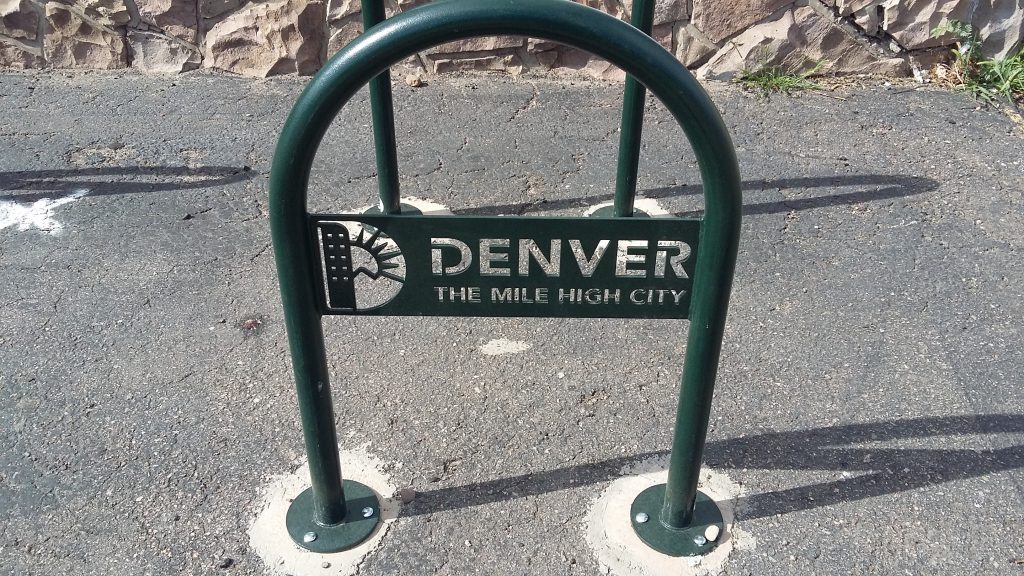Denver Experiments with Paying People to Ride Bikes
All the city news you can use.

A bike rack in Denver, CO. Photo by Xnatedawgx, (CC BY-SA 4.0), via Wikimedia Commons
Every day at The Overhead Wire we sort through over 1,500 news items about cities and share the best ones with our email list. Each week, we take some of the most popular stories and share them with Urban Milwaukee readers. They are national (or international) links, sometimes entertaining and sometimes absurd, but hopefully useful.
Denver bike experiment: In 2020 voters approved a Climate Protection Fund that allows the city to fund programs that reduce carbon emissions. This year, the fund was used in part to test ways in which the city could boost biking by contracting with community groups to try different strategies to increase ridership. The one that worked best was a $1 per mile program for riders who traded in car trips for bike trips and even kept doing so after the program ended. (Kyle Harris | Denverite)
Deaths reduced in Wales: 20 mph speed limits in Wales have resulted in 100 fewer deaths and the lowest rate of casualties since records began in 1979 and collisions had been reduced 26%, leading some insurance companies to see drops in claims. Wales chief statistician urged caution about using the information until there were several years worth of data, but the initial results are promising. (David Deans | BBC)
Microplastics filling our brains: Micro plastics are becoming more prevalent in human tissue including the brain. In the last eight years, samples taken from the brain tissue of people after their deaths no matter their age have shown a 50% increase. Microplastics have numerous sources but often come from car tires, textiles, and the inside of disposable water bottles. The impacts of this invasion include increased inflammation and some believe a potential connection with many poor health outcomes. (Shannon Osaka | Washington Post)
Converting offices to tiny homes: A new report from Pew Charitable Trusts and Gensler looked at the possibility of converting office space to housing in both Los Angeles and Houston. What they came up with were dorm style living arrangements that would cost renters half the current median rents but require public subsidy. They argue it’s much less expensive than converting to traditional apartments because of office floor plates. (Alex Horowitz | Pew Charitable Trusts)
How to help people of Philadelphia become homeowners: Researchers at a Philadelphia area CDFI found that investors are more likely to purchase homes not in hot neighborhoods but in areas with high concentrations of people of color in order to exploit the rent gap. This creates the toxic mix that leads to displacement and denial of opportunities for home buyers of color. Advocacy organizations and non-profits could help by creating more opportunities to get people into homes or ensure that they remain (Emily Dowdall, Katharine Nelson, and Michelle Schmitt | Nonprofit Quarterly)
Quote of the Day
On the face of it, the memo’s commitment to “the accessibility of transportation to families with young children” might sounds benign — until you consider that truly doing so would require confronting the devastating cost of universal car dependence on American families, something neither Duffy nor Trump is proposing.
–Kea Wilson in Streetsblog USA discussing a new USDOT memo that would use birth and marriage rates as a formula for transportation funding.
This week on the Talking Headways podcast, we’re joined by Professor Sara Bronin to talk about her book Key to the City: How Zoning Shapes Our World.
Want more links to read? Visit The Overhead Wire and signup.
If you think stories like this are important, become a member of Urban Milwaukee and help support real, independent journalism. Plus you get some cool added benefits.
Urban Reads
-
Congestion Pricing Cuts Air Pollution in New York City
 Dec 14th, 2025 by Jeff Wood
Dec 14th, 2025 by Jeff Wood
-
We Think We Love to Drive. But Do We Really?
 Dec 7th, 2025 by Jeff Wood
Dec 7th, 2025 by Jeff Wood
-
Can Scott Wiener Tackle America’s Housing Crisis?
 Nov 23rd, 2025 by Jeff Wood
Nov 23rd, 2025 by Jeff Wood





















